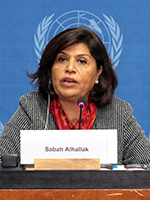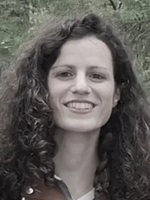Women's Partipation for a Sustainable Peace in Syria
Interview with Sabah Alhallak by Jusaima Moaid-azm Peregrina
Jusaima Moaid-azm Peregrina: What does the 8th of March mean to you?
Sabah Alhallak: March 8th is a day to remind the world of discrimination and violence against women and the need to fight for the abolition of all forms of discrimination and violence against them. It is a day to commemorate all those who fight for our rights in feminist and women's movements.
“March 8th is a day to remind the world of discrimination and violence against women and the need to fight for the abolition of all forms of discrimination and violence against them.”
Jusaima Moaid-azm Peregrina: How have you seen your feminist work impacting the Syrian context? How have you adapted your work to a changing environment?
Sabah Alhallak: Women's struggle has short-term and long-term effects, and I see that our struggle in Syria has led to an improvement in the position and status of Syrian women, as they have reached decision-making positions in the Syrian and international context.
And because the feminist struggle is global and inclusive, it is possible to work in any environment, especially with the existence of spaces of freedom that enable us to work with women of all nationalities, given the presence of Syrian women in most countries of the world nowadays.
Jusaima Moaid-azm Peregrina: What are the challenges of your feminist peace work?
Sabah Alhallak: In Syria, there are political challenges, the positions of the conflicting parties regarding women's rights, since most of them do not consider women's issues or rights on their agenda. There are also social challenges; the inferior status of women in society and the impact of religious beliefs on our status, freedoms, and rights. Economically, most women are still poor and need economic, social, and political empowerment. As for legal challenges, in Syria, there are seven family laws for Islam, Christianity, Druze, and Jews, and in general, they are discriminatory against women. Most of the political and religious forces reject civil law for marriage. This discrimination is also reflected in the constitution and in many other laws.
“We are working, in accordance with UN Resolution 1325 [...], and we prioritize empowering women for greater political participation and more protection and prevention from all forms of discrimination and violence.”
Jusaima Moaid-azm Peregrina: Do you apply the Women, Peace, and Security Agenda to your work and what role does it play?
Sabah Alhallak: We are working, in accordance with UN Resolution 1325 and all the resolutions in the Women, Peace, and Security Agenda, with large segments of women and men, and we prioritize empowering women for greater political participation and more protection and prevention from all forms of discrimination and violence.
Jusaima Moaid-azm Peregrina: What is your feminist vision for the future of Syria?
Sabah Alhallak: I link women's participation to making a peace agreement because it will be sustainable and will guarantee the rights of all citizens, leading to a civil state in which all people enjoy their rights, freedoms, and duties.
“I link women’s participation to making a peace agreement because it will be sustainable and will guarantee the rights of all citizens, leading to a civil state in which all people enjoy their rights, freedoms, and duties.”
Sabah Alhallak is a board member of the Syrian Women’s League and member of the Women’s Advisory Board for the UN Special Envoy to Syria, a member of the Constitutional Committee, and a member of the National Agenda for the Future of Syria (NAFS) Steering Committee. Sabah Alhallak is a women’s rights activist, a CEDAW expert and a specialist in women’s and citizens’ equal rights. Moreover, she is active in both international and national processes related to women’s representation in peacebuilding and transition for a new democratic Syria. She is furthermore a member of the Syrian Women's Initiative for Peace and Democracy and has most recently participated in a UN General Assembly event on Syria, as well as events in the Human Rights Council and the CEDAW pre-session.
Jusaima Moaid-azm Peregrina from the University of Granada was a visiting fellow at PRIF's research department International Security, from January to March 2023. Her main research lines address international mediation and political change processes, civil society inclusion, and women’s political participation, focusing on Syria. During her stay at PRIF, she will be addressing the nexus between multi-track and women’s inclusion in peace mediation.
A Conversation with

Sabah Alhallak
Expert in Women's and Citizens' Equal Rights Councils

Jusaima Moaid-azm Peregrina
Former Visiting Fellow at PRIF